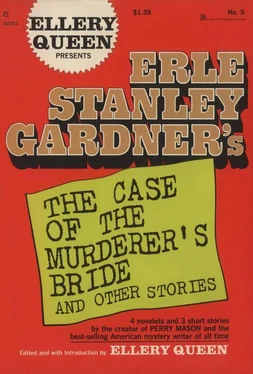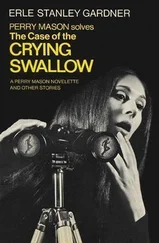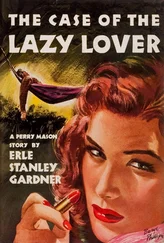Erle Gardner - Erle Stanley Gardner’s The Case of the Murderer’s Bride and Other Stories
Здесь есть возможность читать онлайн «Erle Gardner - Erle Stanley Gardner’s The Case of the Murderer’s Bride and Other Stories» весь текст электронной книги совершенно бесплатно (целиком полную версию без сокращений). В некоторых случаях можно слушать аудио, скачать через торрент в формате fb2 и присутствует краткое содержание. Город: New York, Год выпуска: 1974, Издательство: Davis Publications, Жанр: Классический детектив, на английском языке. Описание произведения, (предисловие) а так же отзывы посетителей доступны на портале библиотеки ЛибКат.
- Название:Erle Stanley Gardner’s The Case of the Murderer’s Bride and Other Stories
- Автор:
- Издательство:Davis Publications
- Жанр:
- Год:1974
- Город:New York
- ISBN:нет данных
- Рейтинг книги:4 / 5. Голосов: 1
-
Избранное:Добавить в избранное
- Отзывы:
-
Ваша оценка:
- 80
- 1
- 2
- 3
- 4
- 5
Erle Stanley Gardner’s The Case of the Murderer’s Bride and Other Stories: краткое содержание, описание и аннотация
Предлагаем к чтению аннотацию, описание, краткое содержание или предисловие (зависит от того, что написал сам автор книги «Erle Stanley Gardner’s The Case of the Murderer’s Bride and Other Stories»). Если вы не нашли необходимую информацию о книге — напишите в комментариях, мы постараемся отыскать её.
Erle Stanley Gardner’s The Case of the Murderer’s Bride and Other Stories — читать онлайн бесплатно полную книгу (весь текст) целиком
Ниже представлен текст книги, разбитый по страницам. Система сохранения места последней прочитанной страницы, позволяет с удобством читать онлайн бесплатно книгу «Erle Stanley Gardner’s The Case of the Murderer’s Bride and Other Stories», без необходимости каждый раз заново искать на чём Вы остановились. Поставьте закладку, и сможете в любой момент перейти на страницу, на которой закончили чтение.
Интервал:
Закладка:
Just as the thrill of pride swept, through George whenever he looked at the well-kept restaurant, the graveled parking area, and the constantly accelerating stream of traffic which poured by on the main highways — a traffic which furnished him with a constantly increasing number of customers — so did George thrill with a sense of possessive pride whenever he looked at Stella’s curved figure.
There was no question but that Stella knew how to wear clothes. Somewhere, George thought, there must in Stella’s past have been a period of prosperity, a period when she had worn the latest Parisian models with distinction. Now she wore the light blue uniform, with the white starched cuffs above the elbow and the white collar, with the same air of distinction. She not only gave class to the uniforms but she gave class to the place.
When Stella walked, the lines of her figure rippled smoothly beneath the clothes. Customers looking at her invariably looked again. Yet Stella was always demure, never forward. She smiled at the right time and in the right way. If the customer tried to get intimate, Stella always managed to create an atmosphere of urgency so that she gave the impression of an amiable, potentially willing young woman who was too busy for intimacies.
George could tell from the manner in which she put food down at a table and smilingly hurried back to the kitchen, as though on a matter of the greatest importance, just what was being said by the people at the table — whether it was an appreciative acknowledgment of skillful service, good-natured banter, or the attempt on the part of predatory males to make a date.
But George had never inquired into Stella’s past. Because of his own history he had a horror of anything that even hinted of an attempt to inquire into one’s past. The present was all that counted.
Stella herself avoided going to the city. She went on a shopping trip once or twice a month, attended an occasional movie, but for the rest stayed quietly at home in the little motel a couple of hundred yards down the roadway.
George was aroused from his reverie by a tapping sound. The man at the counter was tapping a coin on the mahogany. He had entered from the east door and George, contemplating the restaurant, hadn’t noticed him.
During this period of slack time in the afternoon Stella was the only waitress on duty. Unexpectedly half a dozen tables had filled up and Stella was busy.
George departed from his customary post at the cash register to approach the man. He handed over a menu, filled a glass with water, arranged a napkin, spoon, knife, and fork, and stood waiting.
The man, his hat pulled well down on his forehead, tossed the menu to one side with a gesture almost of contempt.
“Curried shrimp.”
“Sorry,” George explained affably, “that’s not on the menu today.”
“Curried shrimp,” the man repeated.
George raised his voice. Probably the other was hard of hearing. “We don’t have them today, sir. We have—”
“You heard me,” the man said. “Curried shrimp. Go get ’em.”
There was something about the dominant voice, the set of the man’s shoulders, the arrogance, that tugged at George’s memory. Now that he thought back on it, even the contemptuous gesture with which the man had tossed the menu to one side without reading it meant something.
George leaned a little closer.
“Larry!” he exclaimed in horror.
Larry Giffen looked up and grinned. “Georgie!” The way he said the name was contemptuously sarcastic.
“When — when did you — how did you get out?”
“It’s okay. Georgie,” Larry said. “I went out through the front door. Now go get me the curried shrimp.”
“Look, Larry,” George said, making a pretense of fighting the feeling of futility this man always inspired, “the cook is cranky. I’m having plenty of trouble with the help and—”
“You heard me,” the man said. “Curried shrimp. Go get ’em.”
George met Larry’s eyes, hesitated, turned away toward the kitchen.
Stella paused beside the range as he was working over the special curry sauce.
“What’s the idea?” she asked.
“A special.”
Her eyes studied his face. “How special?”
“Very special.”
She walked out.
Larry Giffen ate the curried shrimp. He looked around the place with an air of proprietorship.
“Think maybe I’ll go in business with you, Georgie.”
George Ollie knew from the dryness in his mouth, the feeling in his knees, that that was what he had been expecting.
Larry jerked his head toward Stella. “She goes with the joint.”
Ollie, suddenly angry and belligerent, took a step forward. “She doesn’t go with anything.”
Giffen laughed, turned on his heel, started toward the door, swung back, said, “I’ll see you after closing tonight,” and walked out.
It wasn’t until the period of dead slack that Stella moved close to George.
“Want to tell me?” she asked.
He tried to look surprised. “What?”
“Nothing.”
“I’m sorry, Stella. I can’t.”
“Why not?”
“He’s dangerous.”
“To whom?”
“To you — to both of us.”
She shrugged. “You never gain anything by running.”
He pleaded with her. “Don’t get tangled in it, Stella. You remember last night the police were out here for coffee and doughnuts after driving around like mad — those two big jobs, the one on the safe in the bank, the other on the theater safe?”
She nodded.
“I should have known then,” he told her. "That’s Larry’s technique. He never leaves them anything to work on. Rubber gloves so there are no fingerprints. Burglar alarms disconnected. Everything like clockwork. No clues. No wonder the police were going crazy. Larry Giffen never leaves them a clue.”
She studied him. “What’s he got on you?"
George turned away, then faced her, tried to speak, and couldn’t.
“Okay,” she said. “I withdraw the question.”
Two customers came in. Stella escorted them to a table and went on with the regular routine. She seemed calmly competent, completely unworried. George Ollie, on the other hand, couldn’t get his thoughts together. His world had collapsed. Rubber-glove Giffen must have found out about George’s bank job with the green accomplice, otherwise he wouldn’t have dropped in.
News travels fast in the underworld. Despite carefully cultivated changes in his personal appearance, some smart ex-con while eating at the restaurant must have “made” George Ollie. He had said nothing to George, but had reserved the news as an exclusive for the ears of Larry Giffen. The prison underworld knew Big Larry might have use for George — as a farmer had use for a horse.
And now Larry had “dropped in.”
Other customers arrived. The restaurant filled up. The rush-hour waitresses came on. For two and a half hours there was so much business that George had no chance to think. Then business began to slacken. By eleven o’clock it was down to a trickle. At midnight George closed up.
“Coming over?” Stella asked.
“Not tonight,” George said. “I want to do a little figuring on a purchase list.”
She said nothing and went out.
George locked the doors, put on the heavy double bolts, and yet, even as he turned out the lights and put the bars in place, he knew that bolts wouldn’t protect him from what was coming.
Larry Giffen kicked on the door at 12:30.
George, in the shadows, pretended not to hear. He wondered what Larry would do if he found that George had ignored his threat, had gone away and left the place protected by locks and the law.
Larry Giffen knew better. He kicked violently on the door, then turned and banged it with his heel — banged it so hard that the glass rattled and threatened to break.
Читать дальшеИнтервал:
Закладка:
Похожие книги на «Erle Stanley Gardner’s The Case of the Murderer’s Bride and Other Stories»
Представляем Вашему вниманию похожие книги на «Erle Stanley Gardner’s The Case of the Murderer’s Bride and Other Stories» списком для выбора. Мы отобрали схожую по названию и смыслу литературу в надежде предоставить читателям больше вариантов отыскать новые, интересные, ещё непрочитанные произведения.
Обсуждение, отзывы о книге «Erle Stanley Gardner’s The Case of the Murderer’s Bride and Other Stories» и просто собственные мнения читателей. Оставьте ваши комментарии, напишите, что Вы думаете о произведении, его смысле или главных героях. Укажите что конкретно понравилось, а что нет, и почему Вы так считаете.












